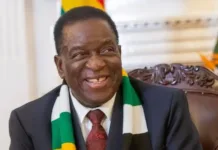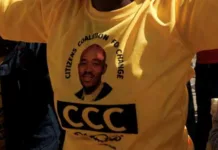
Thousands of Zimbabweans have taken to the streets of the capital and other cities to demand the resignation of President Robert Mugabe.
In a party atmosphere, they tore pictures of Mr Mugabe and at one point marched to his office and residence.
The army took over on Wednesday, days after Mr Mugabe sacked his deputy, signalling that he favoured his wife Grace as his successor.
Mr Mugabe, 93, has led Zimbabwe since independence from Britain in 1980.
The military has kept him confined to his residence and says it is “engaging” with him and will advise the public on the outcome of talks “as soon as possible”.
Saturday’s rally had the support of the army and members of the governing Zanu-PF party.
Veterans of Zimbabwe’s war for independence – who until last year were loyal to the president, the best-known among them – are also saying Mr Mugabe should quit.
Outside State House, the official residence, some people staged a sit-down protest in front of a line of troops, and opposition leader Morgan Tsvangirai addressed the crowd, to cheers.
The BBC’s Andrew Harding in Harare says this is a watershed moment and there can be no return to power for Mr Mugabe.
Our correspondent says the situation may appear to be getting out of Zanu-PF’s control and there could be a broad push to introduce a transitional government that includes the opposition.
On Friday, Mr Mugabe made his first public appearance since being confined to his house.
He spoke only to open the graduation at a university of which he is chancellor.
Grace Mugabe was not present. It had been thought she had left the country but it emerged on Thursday that she was at home with Mr Mugabe.
Mr Mugabe sacked Vice-President Emmerson Mnangagwa last week, apparently to pave the way for Grace Mugabe, who is four decades younger than him, to take over the presidency.
Zanu-PF’s top body is meeting on Sunday to discuss dismissing Mr Mugabe as party leader.
Source: BBC





